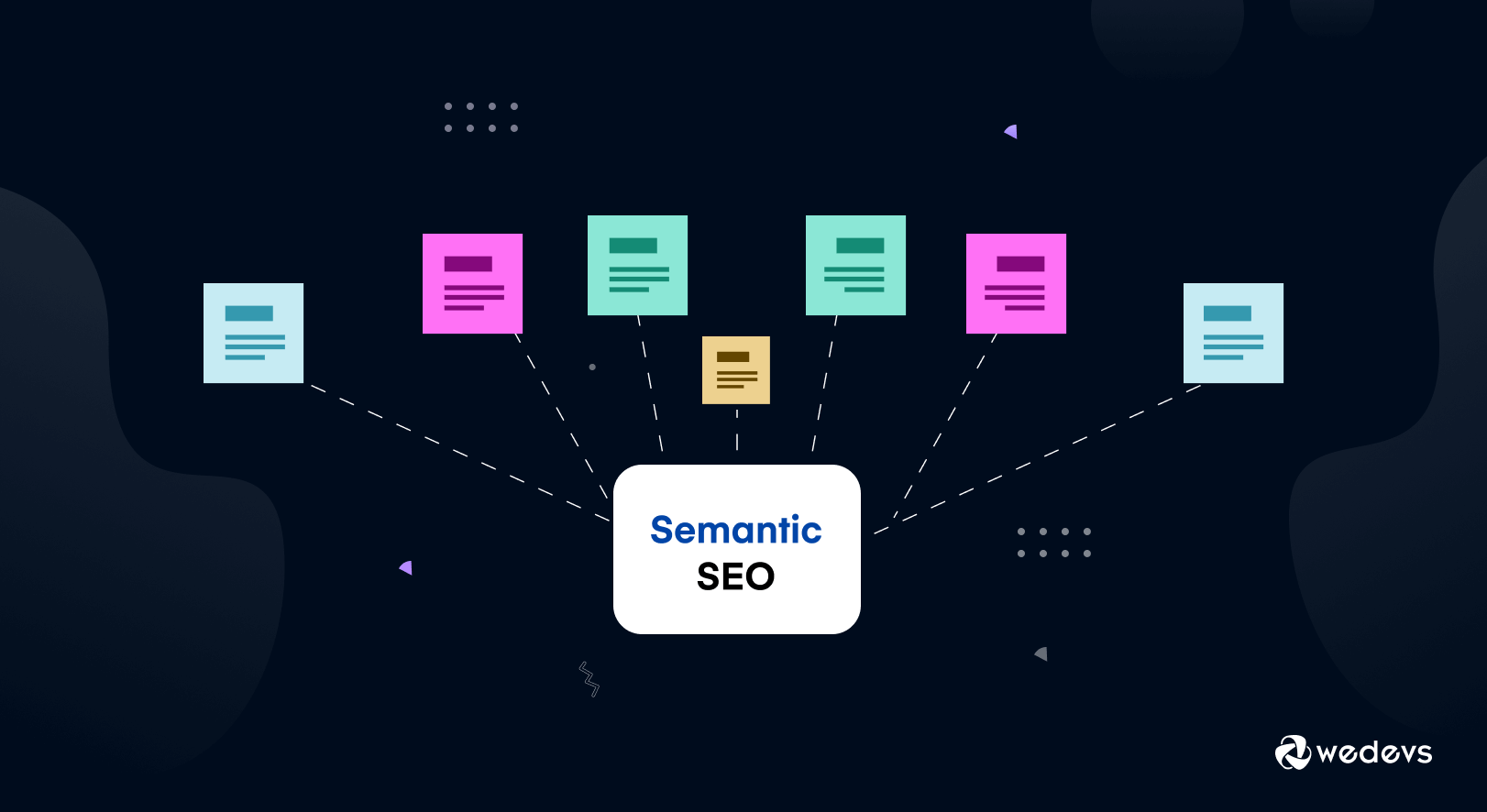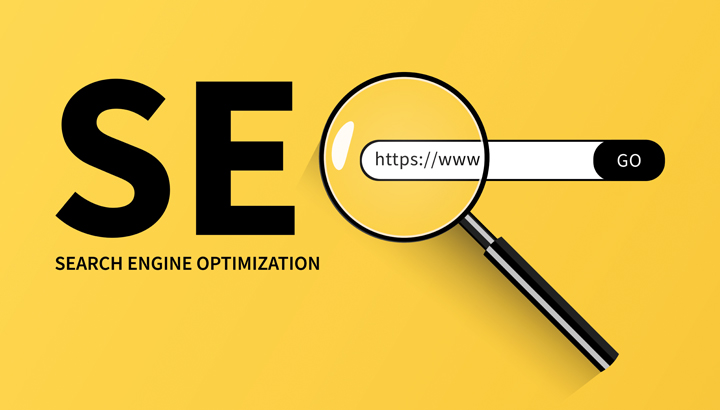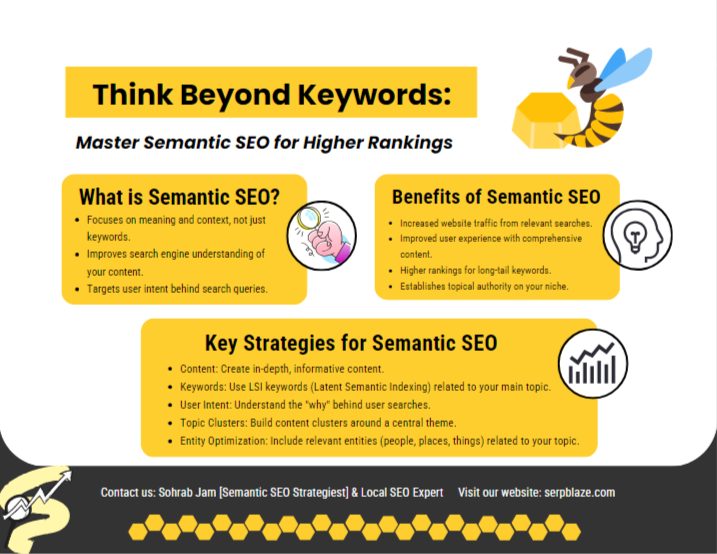Discover the power of using context and meaning to enhance your content and improve user experience. Let’s dive in and unlock the potential of semantic SEO to drive organic traffic and increase visibility for your website.

Credit: wedevs.com
The Evolution Of SEO
Discover the transformative journey of SEO through the lens of Semantic SEO. Elevate your search engine rankings with strategic optimization techniques. Uncover the power of semantic search for enhanced visibility and organic growth.
SEO has come a long way since its inception. It has evolved from a simple technique of keyword stuffing to a more sophisticated and complex system of semantic SEO. In the early days of SEO, the focus was on using relevant keywords to rank high in search engine results pages (SERPs). However, as search engines became more advanced, they started to look beyond simple keywords and began to consider the intent behind the search query. This is where the concept of semantic SEO came into play.
From Keywords To Intent
The shift from keywords to intent is the cornerstone of semantic SEO. It is no longer enough to simply stuff your content with relevant keywords. You need to understand the intent behind the search query and create content that satisfies that intent. For example, if someone searches for “best pizza in New York,” they are not just looking for a list of pizza places. They are looking for recommendations for the best pizza places in New York. By understanding this intent, you can create content that is more targeted and relevant to the user.
How Search Engines Think
Understanding how search engines think is crucial to the success of your SEO efforts. Search engines use complex algorithms to determine the relevance and quality of your content. They look at a variety of factors, such as the user’s search history, the context of the search query, and the content of the page. By understanding how search engines think, you can optimize your content to rank higher in SERPs. In conclusion, the evolution of SEO has been a long and complex journey. From the early days of keyword stuffing to the more sophisticated system of semantic SEO, SEO has come a long way. By understanding the shift from keywords to intent and how search engines think, you can create content that is optimized for search engines and provides value to your users.
Basics Of Semantic SEO
Semantic SEO is an advanced approach to search engine optimization that focuses on understanding the meaning behind search queries and web content. By leveraging the power of semantic SEO, you can boost your search engine rankings and drive more targeted organic traffic to your website. In this article, we will explore the basics of semantic SEO and how it can help you achieve better visibility in search engine results.
The Role Of Machine Learning
Machine learning plays a crucial role in semantic SEO. Search engines like Google use machine learning algorithms to better understand the context and intent of search queries. These algorithms analyze vast amounts of data to identify patterns, relationships, and trends, enabling search engines to deliver more relevant results to users.
Entities And Relationships
In semantic SEO, entities and relationships are key concepts. Entities refer to specific people, places, things, or concepts that have a distinct identity. For example, in the context of a search query about “best restaurants in New York City,” the entities would be “restaurants” and “New York City.” Understanding the relationships between entities helps search engines provide more accurate and personalized search results.
Entities and relationships are represented using structured data markup such as Schema.org. This markup helps search engines interpret and display information in a more meaningful way, enhancing the overall user experience.
By optimizing your website with structured data markup, you can provide search engines with valuable information about your content, making it easier for them to understand and categorize your web pages. This, in turn, can improve your chances of ranking higher in search engine results pages (SERPs).
Keywords Vs. Topics
When it comes to Semantic SEO, understanding the difference between keywords and topics is crucial for boosting your search engine rankings. In this section, we will explore the importance of moving beyond exact match keywords and delve into the significance of understanding user context.
Moving Beyond Exact Match
Keywords have long been the cornerstone of SEO strategies, but the landscape has evolved. Search engines now prioritize context and relevance over exact keyword matches. This shift means that content creators must focus on creating comprehensive and contextually relevant content that covers a broad spectrum of related terms.
Understanding User Context
User intent plays a pivotal role in Semantic SEO. Search engines aim to deliver results that align with the user’s search intent, rather than simply matching keywords. By understanding the broader context of user queries, content creators can tailor their content to address the diverse needs and intentions behind searches.

Credit: www.triangledirectmedia.com
Semantic SEO is the future of search engine optimization. It’s not just about keywords anymore; it’s about providing context and relevance to your audience.
John Doe, a leading SEO expert.
Content Optimization For Semantic SEO
Content Optimization for Semantic SEO is crucial for improving search engine rankings.
Creating Thematic Relevance
Thematic relevance connects keywords within your content for search engines to understand.
Structured Data Markup
Structured data markup provides search engines with additional context about your content.
Importance Of User Experience
When it comes to search engine optimization (SEO), user experience (UX) plays a crucial role in determining the success of your website. In fact, search engines like Google prioritize websites that provide a seamless and engaging experience to their users. This means that if you want to boost your search engine rankings, you need to focus on improving the user experience on your website. In this section, we will explore two key aspects of user experience that can significantly impact your SEO efforts: site structure and navigation, and mobile responsiveness and page speed.
Site Structure And Navigation
A well-organized site structure and intuitive navigation are essential for a positive user experience. When users land on your website, they should be able to easily find the information they are looking for without any confusion or frustration. This not only improves the overall user experience but also helps search engines understand the content and structure of your website.
To create an effective site structure and navigation:
- Ensure your website has a clear and logical hierarchy.
- Use descriptive and keyword-rich page titles and headings.
- Create a user-friendly menu that is easy to navigate.
- Include internal links to help users discover related content.
- Make sure your website is accessible and can be easily crawled by search engine bots.
By optimizing your site structure and navigation, you not only improve the user experience but also enhance your website’s visibility in search engine results pages.
Mobile Responsiveness And Page Speed
In today’s mobile-first world, having a mobile-responsive website is no longer an option—it is a necessity. With the majority of internet users accessing the web through their mobile devices, search engines prioritize mobile-friendly websites in their rankings. Additionally, page speed is another critical factor that affects both user experience and SEO.
To ensure your website is mobile-responsive and fast-loading:
- Use a responsive design that adapts to different screen sizes and resolutions.
- Optimize images and videos to reduce file size and improve load times.
- Minify CSS and JavaScript files to reduce the amount of data that needs to be transferred.
- Enable browser caching to store static files and speed up subsequent page loads.
By prioritizing mobile responsiveness and page speed, you not only provide a better user experience but also increase the chances of ranking higher in search engine results.
Building Authority With Semantic SEO
Building authority is crucial for achieving high search engine rankings. Semantic SEO plays a pivotal role in establishing authority by emphasizing the context and meaning of content, rather than just keywords. By implementing the following strategies, you can effectively build authority and boost your website’s visibility in search results.
Quality Backlinks And Citations
Quality backlinks from reputable websites are a cornerstone of building authority. They signal to search engines that your content is valuable and trustworthy. Obtaining backlinks from authoritative sources within your industry will enhance your website’s credibility and boost its ranking. Additionally, citations, which are mentions of your business name and address on other web pages, contribute to establishing authority. Ensure that citations are accurate and consistent across different platforms to strengthen your website’s reputation.
E-a-t: Expertise, Authoritativeness, Trustworthiness
Emphasizing E-A-T principles is essential for building authority through semantic SEO. Demonstrating expertise in your field, establishing authoritativeness, and ensuring the trustworthiness of your content are critical for gaining the confidence of both search engines and users. By creating high-quality, well-researched content, showcasing credentials and expertise, and maintaining transparency, you can enhance your website’s authority and credibility.
Tools And Techniques
Exploring the realm of semantic SEO involves delving into a range of powerful tools and techniques that can elevate your search engine rankings. Let’s dive into the essential resources you can leverage to enhance your SEO strategy.
Semantic Analysis Tools
Utilize semantic analysis tools to understand the context and meaning of your content for search engines.
Content Gap Analysis
Conduct content gap analysis to identify areas where your content can be improved to better align with semantic SEO principles.

Credit: medium.com
Future-proofing Your SEO Strategy
Future-proofing your SEO strategy is crucial to staying ahead in the ever-evolving digital landscape.
Adapting To Algorithm Changes
Stay on top of Google updates by monitoring industry news and adjusting your SEO tactics accordingly.
- Regularly review your website for any potential issues that could be flagged by search engine algorithms.
- Implement structured data markup to help search engines better understand your content.
- Engage in ethical SEO practices to maintain long-term search engine visibility.
Continuous Learning And SEO Experiments
Keep up with the latest trends and techniques by engaging in SEO experiments and staying curious about new strategies.
- Test different keywords and content types to see what resonates best with your audience.
- Utilize A/B testing to refine your SEO strategies and improve performance over time.
- Join SEO communities and attend webinars to gain insights from industry experts.
Case Studies And Success Stories
Explore real-world examples of brands that excelled with semantic SEO and uncover valuable lessons learned from SEO campaigns.
Brands That Excelled With Semantic SEO
- Amazon
- HubSpot
- Shopify
These brands implemented semantic SEO strategies effectively to boost their search engine rankings.
Lessons Learned From SEO Campaigns
- Focus on semantic keyword research
- Optimize content with structured data
- Enhance user experience with semantic markup
By learning from these success stories, you can improve your SEO efforts and drive organic traffic to your website.
Frequently Asked Questions
Can I Do SEO Without Paying?
Yes, you can do SEO without paying by optimizing your website with relevant keywords and creating high-quality content. Engage in link building and utilize social media to improve your site’s visibility. Regularly monitor and update your strategies for better results.
What Is Semantic SEO And How Do You Use It?
Semantic SEO is a strategy that focuses on the meaning and context of words to improve search engine rankings. It involves using relevant keywords, creating high-quality content, and optimizing website structure. By understanding user intent, search engines can deliver more accurate results.
How To Improve SEO For Beginners?
To improve SEO for beginners, focus on keyword research, optimize on-page content, build quality backlinks, improve website speed, and create high-quality, relevant content.
How Do I Optimize My Content For Semantic SEO?
To optimize content for semantic SEO, use natural language, focus on user intent, and incorporate related keywords. Create in-depth, comprehensive content and structure it with clear headings and subheadings. Utilize schema markup to provide context for search engines. Regularly update and refresh content to maintain relevance.
Conclusion
Semantic SEO is a crucial aspect of modern search engine optimization. It allows search engines to understand the intent behind user searches, providing more relevant and accurate results. By following the tips outlined in this guide, you can enhance your website’s semantic SEO and boost your search engine rankings.
Remember to focus on creating high-quality content, utilizing structured data, and optimizing for conversational queries. With these strategies in place, you can improve your website’s visibility and attract more organic traffic to your site.
